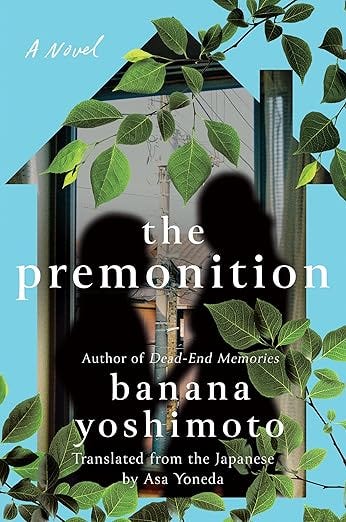Tomorrow is Election Day here in the United States.
I hope you’ve voted, or will be voting tomorrow. FOR HARRIS/WALZ.
What more can I say?
Oh, well, probably a great deal, but you have the assignment. Please complete it in a timely manner.
NB: All Catapult titles, including this 2023 novel by Banana Yoshimoto from Counterpoint Press, include translators’ names on the cover
Today, I’d like to talk about this piece in The Bookseller, an exclusive reveal that Utrecht-based Dutch publisher Veen Bosch & Keuning (VBK) has begun using Artificial Intelligence (A.I.) to translate “some of its books” into English. VBK was acquired by Simon & Schuster (S&S) earlier this year. One might remember that Penguin Random House (PRH) failed in its bid to buy S&S after a landmark ruling in late 2023.
S&S was then acquired by private-equity firm Kohlberg Kravis Roberts (KKR), a move many in the book-publishing industry celebrated, since Richard Sarnoff, a member of its board of directors, had long experience in that industry. (There were/are others on that board with book-publishing experience, but there’s been a lot of turnaround, and their names are irrelevant to my point, ultimately.)
So. KKR has urged S&S to get out there into international markets (this has been reported elsewhere, but it’s in The Bookseller piece, too). “The Bookseller contacted Simon & Schuster to ask if VBK’s AI translation trial had any wider implications for its parent business or if it planned to expand further into Europe. Simon & Schuster declined to comment. “
VBK, however, says:
“We are working on a limited experiment with some Dutch authors, for their books to be translated into English language using AI. There will be one editing phase, and authors have been asked to give permission for this.
“We are not creating books with AI, it all starts and ends with human action. The translations are not yet launched.”
Hmmm.
Or, in Dutch: Hmm. (That’s right, one less “m.”)
The translators interviewed for the piece got shirty about this A.I. move and rightly so. As one says (I urge you to read the article so I don’t simply repeat it all here), if authors wouldn’t write their works using A.I., why would they want their works translated by A.I.?
Technical translators, another interviewee notes, are leaving the profession in droves. If you thought the instruction manuals and booklets were already bad, gear up for near-incomprehensible “Insert Tab A into Tab A” sorts of rubbish.
But what I care about, what you should care about, is how literature, how literary art, is translated. Translation itself is an art, and a difficult one. It has little to do with word-for-word replacement and everything to do with nuance, meaning, tone, and aesthetics. An A.I.-based translation of The Iliad might capture its story, but never its real substance, and only a tiny bit of its style.
How would A.I. cope with the relatively straightfoward narration but incredibly layered tones of Elena Ferrante’s Neapolitan Novels? It wouldn’t. It couldn’t. Please, publishers, leave that kind of work to the Ann Goldsteins (Ferrante’s translator) of the world.
While you’re at it, publishers, I’d much prefer human eyes on ALL phases of the editing process, not just at the start and finish. But what do I know? I’m just an avid reader of literature in translation who cares, deeply, about how great stories and great art come through to readers from as many places in the world as possible.
Did I say this already? VOTE. Our lives depend on it.





I'd like to add something, as a former tech futurist and also director of a DOD lab for language. I'm well acquainted with translators mistrust of machine translation. I'm also used to serving an agency that requires expert-level translation (think diplomacy, for instance), generally believed to be the domain of humans only (still).
First, machine translation has come a long, long way. Thanks to MT, we have the ability to work in many low-density and uncommon languages where there often aren't enough humans to teach the language. But it is a good tool for many lower-level usages. For the linguists I used to work with, it was a way to do triage, to do a quick and dirty first pass for the human to work from and get all the nuance. It's called "assisted work", using tools to help us work better or faster.
I'm not advocating complete machine translation for works of literature. I'm just trying to make folks aware of the big picture. I watched linguists dig in their heels and refuse to use tools our engineers tried to roll out to make their jobs easier. People are protective and wary when it comes to their jobs, I understand. But there are benefits to machine translation, too.
I'm open to AI but so far it has failed me in everything I've tried including book descriptions and synopsi. I heard it was good for initial book translation followed by a human proofread / edit, but after reading your post I also doubt it would be effective. Even total translations by humans leaves me wanting to read the book in the original language although I've heard that a great translator can make the book even better. Thanks for discussing this!